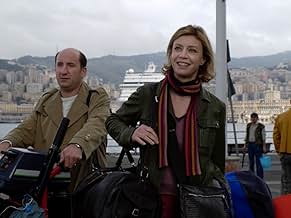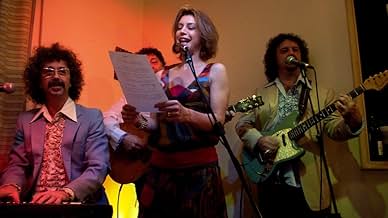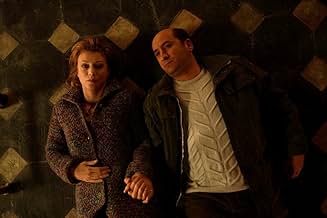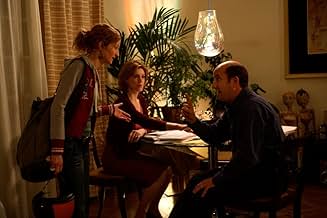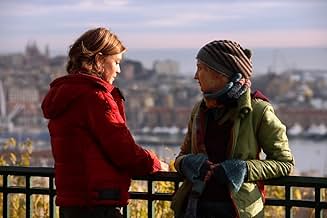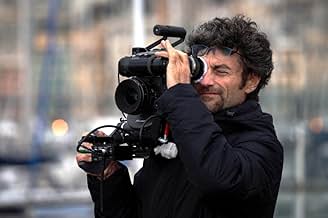CALIFICACIÓN DE IMDb
6.9/10
2.9 k
TU CALIFICACIÓN
Agrega una trama en tu idiomaA well-off and sophisticated couple struggles to stay together after the husband loses his job.A well-off and sophisticated couple struggles to stay together after the husband loses his job.A well-off and sophisticated couple struggles to stay together after the husband loses his job.
- Dirección
- Guionistas
- Elenco
- Premios
- 6 premios ganados y 35 nominaciones en total
Opiniones destacadas
Elsa and Michele are living a comfortable upper middle class life in Genoa ... until Michele is forced out of the company he co-founded. This film examines the effect this event has on Elsa, Michele, their daughter Alice, and their friends. If you are a middle aged person with a good income, then this film will probably touch a raw nerve, since you would have to feel that this could happen to you; if this has happened to you, then you will likely doubly feel the pain.
The film is brutally honest as it shows how Elsa and Michele give up their comforts one step at a time. After Elsa recovers from the initial shock, she is quite practical in looking for work, any kind of work. But it's different for Michele. He has been used to being the breadwinner and deals with serious issues like humiliation, wounded pride, and feelings of worthlessness--one day he was a key player in his work and family and the next day he feels he is nothing. He is so embarrassed that he cannot even reveal the truth to his daughter until she makes an independent discovery of it. Friendships are severely impacted. What has happened to Michele and Elsa has happened to thousands since the economic downturn and their reactions are not atypical, but their story is laid out here in a very affecting manner.
Antonio Albanese (as Michele) and Margherita Buy (as Elsa) turn in very believable performances. No great tricks in cinematography or time sequencing, just straightforward, solid filmmaking.
Life goes on and people cope, but I think it would be difficult to watch this film without responding to its intense emotional content. No matter what your status, it's always hard to take several steps back. Money, work, and status are important and, as illustrated in this film, I think it is the unusual person who can withstand a serious blow in any one of those areas and come out the better for it.
The film is brutally honest as it shows how Elsa and Michele give up their comforts one step at a time. After Elsa recovers from the initial shock, she is quite practical in looking for work, any kind of work. But it's different for Michele. He has been used to being the breadwinner and deals with serious issues like humiliation, wounded pride, and feelings of worthlessness--one day he was a key player in his work and family and the next day he feels he is nothing. He is so embarrassed that he cannot even reveal the truth to his daughter until she makes an independent discovery of it. Friendships are severely impacted. What has happened to Michele and Elsa has happened to thousands since the economic downturn and their reactions are not atypical, but their story is laid out here in a very affecting manner.
Antonio Albanese (as Michele) and Margherita Buy (as Elsa) turn in very believable performances. No great tricks in cinematography or time sequencing, just straightforward, solid filmmaking.
Life goes on and people cope, but I think it would be difficult to watch this film without responding to its intense emotional content. No matter what your status, it's always hard to take several steps back. Money, work, and status are important and, as illustrated in this film, I think it is the unusual person who can withstand a serious blow in any one of those areas and come out the better for it.
Days and Clouds (2007)
Tender, true, and rather moving without being the slightest bit sentimental. This is a look at normal life, in a way, in modern Northern Italy (the setting is Genoa). A fairly comfortable middle aged couple is going through a crisis as one loses a job and the money crunch adds to other everyday stresses.
And that's it. Which is a lot when you realize that that's it. There will be no murder or shocking accidents, no illness or surprise turn of events of any kind, really. Which is why it draws you further and further, gently, with more humor than pathos, until you really believe these people, or these kind of people, exist quite like this. It's not a random slice of life, since there is certainly a core problem being scrutinized (the loss of a job in mid-life, etc.). But in many ways the little events are so "little" in the cinematic sense they are just a small pageant for the viewer.
So what makes it sing beyond the compelling, restrained story is the acting, above all the acting. The couple, the husband and wife facing the crisis, makes sense because the woman (Margherita Buy) and the man (Antonio Albanese) are so perfect at being imperfect. They don't push their crisis too hard, nor do that have the ideal love at the beginning. What they show is the normal troubled tenderness and awkward anger of getting into such a situation.
Besides a second thread following somewhat their daughter's life, which has taken a less materialistic turn then the parents, the movie adds a whole other element throughout--early Renaissance art. The mother happens to have just finished (belatedly) her graduate degree in Italian art from the 1400s. And she is helping restore an obscure small ceiling painting somewhere else in town, seeing it gradually reveal itself as the movie progresses. The reason this matters is it adds an element of beauty and idealism that is implied by the whole rest of the movie. That we (all of us) are not simply here to make ends meet and worry about money. And this something bigger (call it art, call it something spiritual inspired by art or inspiring art) is what holds us up at times.
So by the end the two aspects--the mundane and the ethereal--meld, every so softly. Quite beautiful.
Tender, true, and rather moving without being the slightest bit sentimental. This is a look at normal life, in a way, in modern Northern Italy (the setting is Genoa). A fairly comfortable middle aged couple is going through a crisis as one loses a job and the money crunch adds to other everyday stresses.
And that's it. Which is a lot when you realize that that's it. There will be no murder or shocking accidents, no illness or surprise turn of events of any kind, really. Which is why it draws you further and further, gently, with more humor than pathos, until you really believe these people, or these kind of people, exist quite like this. It's not a random slice of life, since there is certainly a core problem being scrutinized (the loss of a job in mid-life, etc.). But in many ways the little events are so "little" in the cinematic sense they are just a small pageant for the viewer.
So what makes it sing beyond the compelling, restrained story is the acting, above all the acting. The couple, the husband and wife facing the crisis, makes sense because the woman (Margherita Buy) and the man (Antonio Albanese) are so perfect at being imperfect. They don't push their crisis too hard, nor do that have the ideal love at the beginning. What they show is the normal troubled tenderness and awkward anger of getting into such a situation.
Besides a second thread following somewhat their daughter's life, which has taken a less materialistic turn then the parents, the movie adds a whole other element throughout--early Renaissance art. The mother happens to have just finished (belatedly) her graduate degree in Italian art from the 1400s. And she is helping restore an obscure small ceiling painting somewhere else in town, seeing it gradually reveal itself as the movie progresses. The reason this matters is it adds an element of beauty and idealism that is implied by the whole rest of the movie. That we (all of us) are not simply here to make ends meet and worry about money. And this something bigger (call it art, call it something spiritual inspired by art or inspiring art) is what holds us up at times.
So by the end the two aspects--the mundane and the ethereal--meld, every so softly. Quite beautiful.
Times are tough right now, mirroring the era of The Great Depression. Financial security is a ghost, friendships and relationships are tested by walking the razor edge of insolvency, and according to the 'popular movie' polls the escape for many is in the darkened movie houses with comic hero or animal animated mindless safety net entertainment. Not so with the very brilliant film DAYS AND CLOUDS written (with Doriana Leondeff, Francesco Piccolo, and Federica Pontremoli) and directed with immaculate attention to detail by Silvio Soldini (BREAD AND TULIPS, etc). Soldini recreates the global financial nightmare in the form of an examination of one family's fracture and consequences. It resonates despite the depressing story, offering a glimpse into the universal ties that bind us at this moment.
Elsa (Margherita Buy) is graduating from Art History and Restoration school and seems to be a woman on top of her league, complete with surprise gifts and a celebration staged by her husband Michele (Antonio Albanese). Waking up the morning after her congratulations party, Elsa is ill with a hangover, but even more shocked when Michele breaks the news to her that he has been out of work for two months, ashamed that he has lost his company and his job, hiding in the couple's boat during the day. There is no money left and the couple must face losing their home and are forced to take on menial tasks to survive. Pride prevents the couple from sharing their financial downfall with friends and with their one child - Alice (Alba Rohrwacher) who has elected not to pursue education in favor of waiting tables in a restaurant she has invested in with friends. The tension of keeping the secret to themselves causes mounting friction between the couple and events that would have never happened had they shared their misfortune with friends and family bring their relationship to a near fatal end. How they survive is touched, quietly and quickly and gently, at film's end.
Soldini spares no pain in the responses of his characters' misfortune, but at the same time he allows each character to emerge from ideal married tropes to completely human victims of financial ruin. Buy and Albanese are triumphant in their performances as the married couple caught in the crumble of decline. But there are fine performances by Rohrwacher and Fabio Troiano as her lover Riki, and Carla Signoris as Elsa's closest friend Nadia, and actors playing two ex-employees of Michele who provide a window of friendship in Michele's time of desperate need.
The cinematography by Ramiro Cirita and the musical score blending opera and folk music by Giovanni Venosta enhance the motion of the film that though just under two hours in length, appears more succinct. Silvio Soldini has taken a topic that affects us all and polished into a film that is bound to touch every viewer deeply. Highly recommended movie from The Film Movement. Grady Harp
Elsa (Margherita Buy) is graduating from Art History and Restoration school and seems to be a woman on top of her league, complete with surprise gifts and a celebration staged by her husband Michele (Antonio Albanese). Waking up the morning after her congratulations party, Elsa is ill with a hangover, but even more shocked when Michele breaks the news to her that he has been out of work for two months, ashamed that he has lost his company and his job, hiding in the couple's boat during the day. There is no money left and the couple must face losing their home and are forced to take on menial tasks to survive. Pride prevents the couple from sharing their financial downfall with friends and with their one child - Alice (Alba Rohrwacher) who has elected not to pursue education in favor of waiting tables in a restaurant she has invested in with friends. The tension of keeping the secret to themselves causes mounting friction between the couple and events that would have never happened had they shared their misfortune with friends and family bring their relationship to a near fatal end. How they survive is touched, quietly and quickly and gently, at film's end.
Soldini spares no pain in the responses of his characters' misfortune, but at the same time he allows each character to emerge from ideal married tropes to completely human victims of financial ruin. Buy and Albanese are triumphant in their performances as the married couple caught in the crumble of decline. But there are fine performances by Rohrwacher and Fabio Troiano as her lover Riki, and Carla Signoris as Elsa's closest friend Nadia, and actors playing two ex-employees of Michele who provide a window of friendship in Michele's time of desperate need.
The cinematography by Ramiro Cirita and the musical score blending opera and folk music by Giovanni Venosta enhance the motion of the film that though just under two hours in length, appears more succinct. Silvio Soldini has taken a topic that affects us all and polished into a film that is bound to touch every viewer deeply. Highly recommended movie from The Film Movement. Grady Harp
This is a cautionary tale of an upper middle class couple whose life is going down the toilet. The husband Michelle has been forced out of his successful business by his partners but keeps the secret from his wife. Unaware, she continues to work with passion toward her degree in art. He throws an extravagant surprise birthday party for her, and this will be the last day of happiness for both of them.
He drops the bombshell the next morning: I haven't worked for two months, we need to sell cancel our vacation to Asia, let go of the maid, sell our sailboat, and move to a smaller and more affordable place.
Like a dinosaur unable to deal with a climate change, the husband pretends with friends and his daughter that everything is fine. He passes up an opportunity for a meaningful but lower paying management position and sinks into depression as he is forced to accept entry level and temporary jobs. Meanwhile, his wife is trying her best to make this miserable situation work.
A strong but relentlessly grim movie to watch as the couples lives crumble around them. The beautiful city of Genoa has never looked worse as we are immersed in back alleys and scenes of industrial sprawl.
He drops the bombshell the next morning: I haven't worked for two months, we need to sell cancel our vacation to Asia, let go of the maid, sell our sailboat, and move to a smaller and more affordable place.
Like a dinosaur unable to deal with a climate change, the husband pretends with friends and his daughter that everything is fine. He passes up an opportunity for a meaningful but lower paying management position and sinks into depression as he is forced to accept entry level and temporary jobs. Meanwhile, his wife is trying her best to make this miserable situation work.
A strong but relentlessly grim movie to watch as the couples lives crumble around them. The beautiful city of Genoa has never looked worse as we are immersed in back alleys and scenes of industrial sprawl.
10fouadice
"Giorni e nuvole" (2007) is a poignant exploration of love, loss, and resilience. The film beautifully captures the essence of life's unpredictability, showcasing the impact of financial crisis on a seemingly perfect family. The performances are exceptional, particularly by the lead actors, whose chemistry is palpable. The cinematography is stunning, enhancing the emotional depth of the narrative. Director Silvio Soldini crafts a delicate balance between drama and hope, making the viewer reflect on their own relationships. This film is a masterpiece that resonates long after the credits roll, deserving a solid 10-star rating for its heartfelt storytelling and artistic brilliance.
¿Sabías que…?
- TriviaOrietta Notari's debut.
- Bandas sonorasSono Tremendo
Written by Giosy Capuano (as G.Capuano), Mario Capuano (as M.Capuano) and Danilo Ciotti (as A.D.Ciotti)
© Edizioni Chappell, S.r.l. / Fonit Cetra Music Publishing, S.r.l.
Performed by Pivio & Tuscolano Brothers
Courtesy of Warner-Chappell Music (Italiana), S.r.l.
Selecciones populares
Inicia sesión para calificar y agrega a la lista de videos para obtener recomendaciones personalizadas
Detalles
Taquilla
- Presupuesto
- EUR 300,000 (estimado)
- Total en EE. UU. y Canadá
- USD 112,102
- Fin de semana de estreno en EE. UU. y Canadá
- USD 16,707
- 13 jul 2008
- Total a nivel mundial
- USD 6,966,224
- Tiempo de ejecución1 hora 58 minutos
- Color
- Mezcla de sonido
- Relación de aspecto
- 1.85 : 1
Contribuir a esta página
Sugiere una edición o agrega el contenido que falta

Principales brechas de datos
By what name was Giorni e nuvole (2007) officially released in India in English?
Responda

